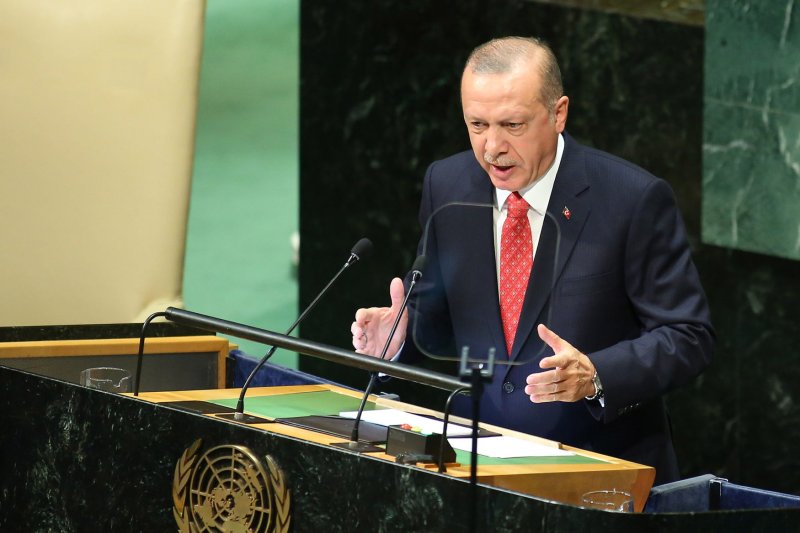1 of 2 | Turkish President Recep Tayyip Erdogan speaks at the United Nations General Assembly in September in New York. File Photo by Monika Graff/UPI |
License Photo
Nov. 13 (UPI) -- Following the murder of journalist Jamal Kashoggi, Turkish President Recep Tayyep Erdogan is said to use the incident to weaken Saudi Arabia and to garner more influence regionally. However, regardless of the murder of Kashoggi,Turkey is set to play an increasingly greater role in Middle East politics.
Turkey's emergence as a regional power can be problematic. By Western standards, Erdogan has a very poor human rights record. He has low tolerance for dissent. For Arab countries, namely Egypt, Saudi Arabia and the United Arab Emirates, he is too Muslim Brotherhood-friendly. He actually supported the Muslim Brotherhood-affiliated faction of the Syrian opposition.
When Eyptian President Abdel Fatah el Sisi took power and ousted the Mohammed Morsi with the support of the UAE and Saudi Arabia, the overthrown members of the Brotherhood took refuge in Turkey. Turkey is also a rival to Saudi Arabia on regional dominance and on the leadership of the Sunni world. It is not by chance that Erdogan every now and then brings out the term "Ottoman." When the Turkish president looks at the Arab countries, he sees and remembers the glory of the Ottoman Empire -- the days when the Turks ruled the Arab world as their colony.
This is why Erdogan champions the Palestinian cause. He is the fierce outspoken critic of Israel. This attitude gives him popularity in the Arab world. This eastward perspective is a reaction to the Europe-snubbing Turkey. Since the time of Kamal Ataturk, the modernizer of the country, Turkey has been running, trying to join the European crowd and to establish itself as an European country. However, Turkey's entry to the European Union has been denied.
After so many years of fruitless effort, the Turks realized they had importance and they had status when they were engaged with the Arab world. Then, they were the leaders, the center, the head. However, with Europe at best they can be a satellite state. From there stems their eagerness to take a greater role in regional politics.
Turkey has two keys assets that drive everyone to court them. Turkey is a member of NATO and has a strategic location. It is a nightmare for the United States if Turkey leaves NATO. But the U.S. bad dream is Russia's sweetest dream: Turkey to leave NATO and join its camp. Being the second-largest army in NATO and located behind the Caspian Sea, just across from Russia, the departure of Turkey would greatly weaken the organization. NATO is the most important line of Western defense, if not the only one, against Russian influence.
Bordering Syria and Iraq, it is impossible for the United States to stabilize both countries and pacify pro-Iranian factions without the help of Turkey. To start with, the United States cannot maintain and solidify its position in the north and northeast of Syria unless it cooperates with Turkey. It needs the support of Turkey to ensure logistical support for American troops. It needs trade with Turkey in order to create a viable economic life in those areas. Prosperity will allow the United States to better engage with the local population and fight radicalization.
The United States realized it cannot afford to upset the Turks. Though the United States relies on the Syrian Democratic forces, mainly composed of Kurdish fighters, who are highly antagonistic to their northern neighbor, the Americans had to make major concessions to Turkey. The United States
conceded the very strategic town of Menbej and drove out from it Saraya Kindil, the Kurdish armed group. The row on the arrest of the American pastor Andrew Brunson was resolved amicably and he was finally released.
Realizing its importance, Turkey has been camp swinging. From time to time, it lends a hand to the Russians. Nevertheless, the Astana and the Tehran summit in September to solve the looming Idlib crisis showed that a Turkish-Russian-Iranian alliance is not very likely. However, the United States should not take anything for granted.
Turkey by itself does not have enough power to dominate the Arab world, but it has enough weight to determine which camp will control the region. Though Erdogan might not be the United States' nor the Arab Gulf's best friend, they need to have enough farsightedness and pragmatism to realize that Turkey should not be sidelined, ignored or confronted.
Also, dealing with Turkey is a delicate affair. Cooperating with Turkey is needed, while making sure that the Ottoman genie remains in the bottle. Turkey's expansionism and its streaks of political Islam should be contained. However, in order to stabilize the Middle East, you would rather have the Turks with you than against you.
Dania Koleilat Khatib is executive director of the Al Istishari Al Strategy Center for Economic and Future Studies, a UAE-based independent think tank. She specializes in U.S.-Arab relations and researches sectarianism, extremism and governance. Her book "The Arab Lobby and the U.S.: Factors for Success and Failure" was published by Routledge UK and translated to Arabic.















